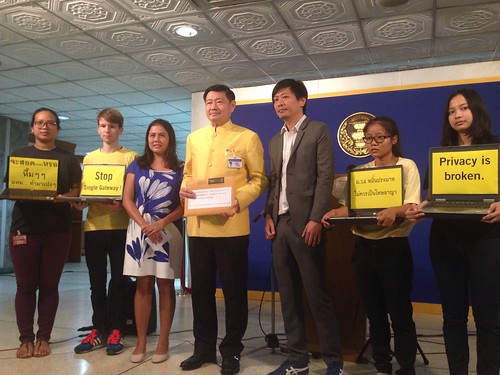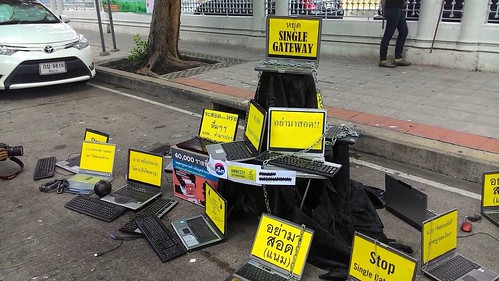Civil society groups have urged lawmakers not to pass the new Computer Crime Bill, as it further violates the rights to freedom of expression and to privacy.
Representatives from the Thai Netizen Network (TNN), an internet freedom advocacy group, on Thursday, 6 July 2016, submitted a petition to Peerasak Porjit, Deputy President of the National Legislative Assembly (NLA), urging the authorities to halt the process to pass the amended version of the Computer Crime Act.
The petition, which has been signed by 40,000 people through an online campaign via change.org, states that the new bill will further limit freedom of expression, violate the right to privacy and restrict access to information.
At the same time, many volunteers from Amnesty International (AI) gathered in front of Parliament in Bangkok on Thursday morning in support of the petition, putting chains and leaflets on used laptops with messages such as ‘stop surveillance’ and ‘stop single [internet] gateway’.
In May, Amnesty International, the Thai Netizen Network (TNN) and Privacy International handed a joint statement to Pol Gen Chatchawan Suksomjit, Chair of the NLA committee vetting the amended version of the Computer Crime Act.
The rights groups recommended that the act should be amended in accordance to the International Covenant on Civil and Political Rights (ICCPR), fearing that the new version of the Act might be worse than the current one.
The three organisations have pointed out that Article 14 of the current act can be used to prosecute people who import or distribute online contents which could ‘cause public panic’. As interpretations of what constitutes public panic are broad, this is a major constraint on internet freedom.
In addition, Article 15 of the Act stipulates that Internet Service Providers (ISPs) face the same penalties as persons who violate Article 14 of the Computer Crime Act, against the importation of illegal online information, if the ISPs cannot prove that they did not cooperate with the offenders of Article 14.
This Article leads to self-censorship, the three rights groups stated.
Article 20 of the 2007 Computer Crime Act also allows the Thai authorities to delete online information which could lead to ‘public unrest and affect public morale’ even when such information is not illegal under any law.

Arthit Suriyawongkul, coordinator of TNN, and volunteers from Amnesty International submit a petition to the National Legislative Assembly (NLA) at Parliament in Bangkok on 7 July 2016

Prachatai English is an independent, non-profit news outlet committed to covering underreported issues in Thailand, especially about democratization and human rights, despite pressure from the authorities. Your support will ensure that we stay a professional media source and be able to meet the challenges and deliver in-depth reporting.
• Simple steps to support Prachatai English
1. Bank transfer to account “โครงการหนังสือพิมพ์อินเทอร์เน็ต ประชาไท” or “Prachatai Online Newspaper” 091-0-21689-4, Krungthai Bank
2. Or, Transfer money via Paypal, to e-mail address: [email protected], please leave a comment on the transaction as “For Prachatai English”
